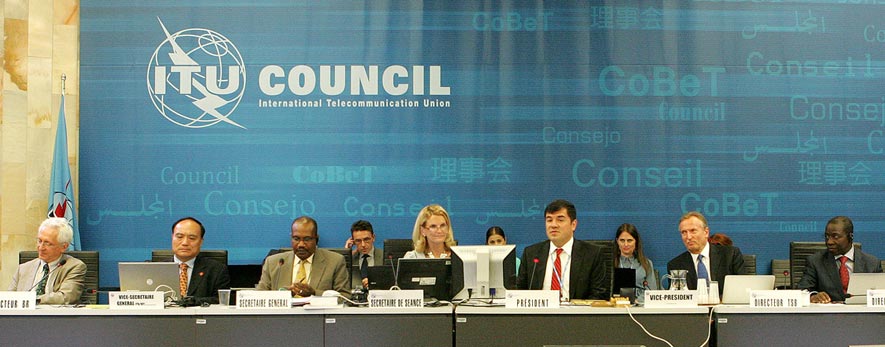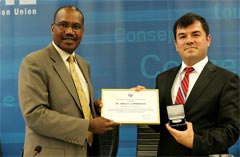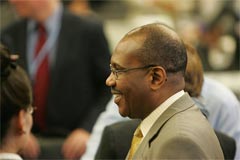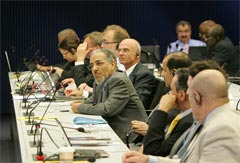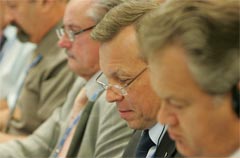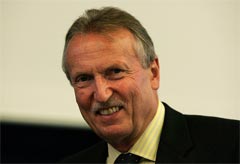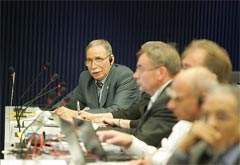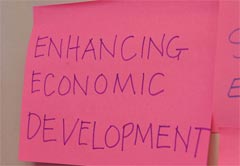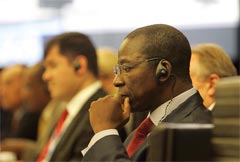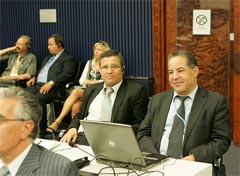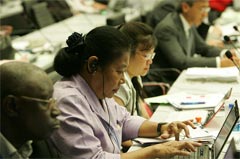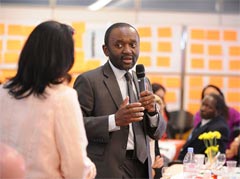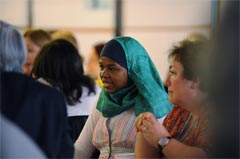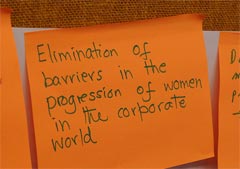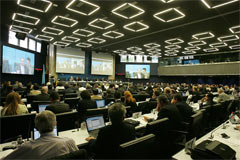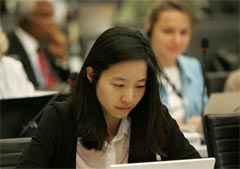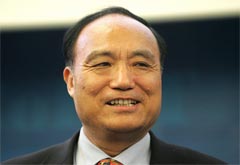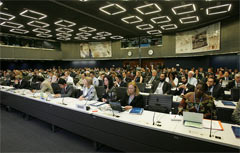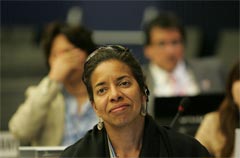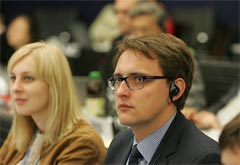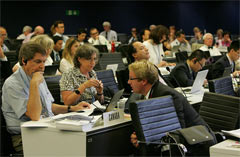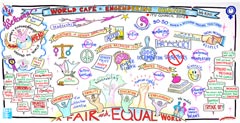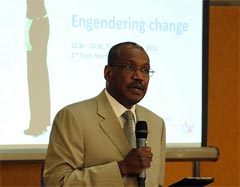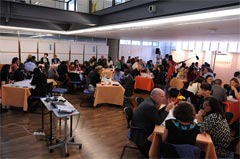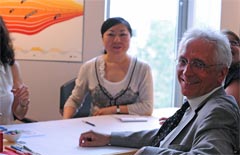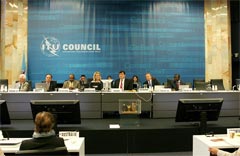Council ends in record time
More than 341 participants representing the 48 Member States of Council, 31 Member State Observers, and 7 Sector Member Observers took part in this year’s Council session, which ended ahead of schedule (12 instead of 13 July). In a total of 13 meetings – 10 Plenary Meetings and 3 meetings of the Standing Committee on Administration and Management – the Council reviewed 78 input documents, including 21 contributions from Member States and adopted 19 formal key issues. This double issue of the Highlights concludes our coverage of Council 2012.
Council in Plenary ― 11 July
Responding to global challenges
Gearing up for WCIT-12
The World Conference on International Telecommunications (WCIT-12) will take place for 10 working days from 3-14 December 2012, in Dubai. The Council Working Group on WCIT, chaired by Alexander Kushtuev, has held eight preparatory meetings.
A letter from a group of civil society organizations addressed to the ITU Secretary-General had been submitted to the Council for information. In that letter, the organizations call for access to WCIT documents and release of all preparatory materials.
Doreen Bogdan-Martin (SPM) and Reinhard Scholl presented Document C12/31 (Rev.2) and highlighted the points on which Council decisions were needed.
In the light of general trends towards more transparent, open access to documentation, not only among United Nations organizations but also at the national level, the Council was to decide on the following point: considering the global scope and potential long-term impact on all stakeholders of topics under discussions during the WCIT preparatory process, and in order to facilitate a global dialogue on the matters under consideration, the Secretary-General invites Council to consider taking a more transparent and open stance on the ITR revision process and to authorize public access to subsequent revisions of CWG-WCIT12/TD-64. This would also help in addressing the extensive press speculation regarding the ITR review process and proposals made to CWG-WCIT-12, bearing in mind that the first version of CWG-WCIT12/TD-64 ― containing the compilation of proposals without reference to their source ― has already been made public by unauthorized means. Also, certain countries will conduct national consultations, during which some of the outputs of CWG-WCIT-12 will anyway be made public.
Secretary-General proposes online consultation
Considering the strong public interest in the revision of the ITRs, the Secretary-General is of the view that it would be appropriate to organize an online public consultation. Such an online consultation “open to all” would start in late July 2012 and be phased sporadically in the run up to WCIT. It is the Secretary- General’s opinion that conducting the consultation online will ensure that a maximum number of interested parties can engage, thereby creating a deeper and clearer understanding of ITU, the role of the ITU secretariat, the ITRs and the WCIT process. Key objectives would include further strengthening the credibility and reputation of ITU and the WCIT process, which have been victims of a series of inaccurate media reports in recent times.
The proposed online consultation could be organized by the ITU secretariat, be moderated, and be interactive. It would direct online communities to official ITU information. A publicly available CWG-WCIT12/TD-64 could form the basis for substantive aspects of the online consultation. The ITU secretariat would assist the moderator to conduct a well-managed, transparent online consultation with the ultimate purpose of providing the membership with a good indication of the concerns being expressed by non-ITU members, civil society stakeholders and others.
WCIT discussions
The Chairman of CWG-WCIT introduced his report. Several councillors took the floor to thank the group for its work. Several stressed that it was important that translated versions of the CWG-WCIT output document be available well before the conference. The ITU secretariat confirmed that all efforts were being made to have the translations available rapidly and expected that they would be published by the end of July 2012, prior to the statutory 3 August deadline.
Brazil introduced a proposal to establish a deadline of one month prior to WCIT for the submission of proposals from Member States, so as to allow sufficient time for translation and for Member States to study the proposals. It was agreed that a Council Decision to that effect could not be inconsistent with the provisions of Plenipotentiary Resolution 165. Consequently, Brazil offered to revise its proposal, coordinating with the ITU secretariat, so as to avoid any such inconsistencies. It was agreed that Brazil would present a revised proposal for approval by the Council on Thursday, 12 July.
The Secretary-General invited the Council to allow public access to Document CWG-WCIT/TD-64, to authorize him to conduct an open consultation on WCIT, and to reflect further on how to adapt ITU policies and practices to today’s needs, taking into account that many United Nations agencies have less restrictive access rules than does the ITU, and that the access policy is not defined in the basic texts: it is derived from practice, which differs between Sectors.
During the discussion that followed, the United Arab Emirates introduced its proposal that the Council authorize it to publish, on its website, all CWG-WCIT documents, but in particular CWG-WCIT/TD-64 and TD-62.
The Council then discussed the need to look at a policy on public access to documents, taking into account 3.8 of Document C12/31. Bruce Gracie of Canada suggested to lead an informal gathering of interested countries.
There followed a frank and lively discussion, in which there was general support for allowing public access to CWG-WCIT/TD-64, but different views were expressed on the proposed open consultation.
Following various proposals by the Chairman to find a compromise solution, it was finally agreed first, regarding access to documentation, that CWG-WCIT/TD-64 will be made publicly available on the ITU website without any password restriction. And second, that a publicly accessible webpage should be established on the ITU WCIT website where all stakeholders can express their views and opinions on the content of CWG-WCIT/TD-64 or any other matter related to WCIT. Input to the webpage will be closed one month prior to WCIT (3 November). All Member States are encouraged to give due consideration to these views and opinions in their preparation for the WCIT. In the light of this decision, the United Arab Emirates withdrew its previous proposal to publish WCIT documents.
Global Standards Symposium links with WTSA
Reinhard Scholl (TSB) presented an update of the Global Standards Symposium (GSS) and the World Telecommunication Standardization Assembly (WTSA) as contained in Document C12/31(Rev.2).
The 2nd Global Standards Symposium will take place prior to WTSA-12 on 19 November. Ministers, regulators, heads of other international, regional and major national standards bodies, and industry leaders from all over the world will discuss global ICT standards challenges with a focus on the intersection of the ICT sector with other vertical sectors such as health care, utilities, and transport. The Chairman of the GSS will present the conclusions of the GSS to the first plenary meeting of WTSA.
During WTSA there will be three side events: e-health standards; ICT innovation in developing countries; and resilience of networks to natural disasters. There will also be the opportunity for Sector Members to showcase some of the new exciting products that are being produced to ITU-T standards. On 20 November there will be an academia session.
Council agreed that, in the light of Resolution 169 (Guadalajara, 2010) “Admission of academia, universities and their associated research establishments to participate in the work of the three Sectors of the Union”, and keeping in mind that academia are dealing with matters of interest for the WTSA, academia can be invited on a trial basis to attend WTSA as observers in a non-advisory capacity.
World Telecommunication Development Conference to be held in Egypt in 2014
The Council has decided that the World Telecommunication Development Conference will be held in Egypt from 31 March to 13 April 2014 following Egypt’s confirmation that it would host the event. At its session in 2011, the Council had proposed the timing for holding this event.
ITU received an offer from the Government of Egypt on 24 January 2012 expressing its interest to host WTDC-14, along with the WSIS+10 high-level event on the Overall Review of the Implementation of the Outcomes of the World Summit on the Information Society. A site visit took place from 28 to 31 May 2012 to consider possible venues.
Yury Grin presented the “Report by the Director of BDT on the World Telecommunication Development Conference 2014” (Document C12/32) summarizing the actions taken so far to organize the event. The Council also approved the proposed draft agenda found in annex to this document.
Preparatory process
In order to prepare WTDC-14, BDT is tasked with the organization, within the financial limitations established by the Plenipotentiary Conference, of one regional development conference or preparatory meeting per region, making full use of the regional offices to facilitate such conferences or meetings.
Based on the dates that were submitted to the 2011 session of the Council, negotiations are also under way with a number of potential host countries that have expressed interest in hosting a regional preparatory meeting for their region.
Connect the World Initiative
The Council noted Document C12/34, presented by Karim Boussaid, reporting on the Connect the World initiative, launched in 2005 to help mobilize partners and resources needed to implement WTDC and WSIS outcomes. A series of regional summits brings together committed stakeholders to invest in ICT.
The first in the series, Connect Africa, was held in 2007. This was followed by Connect CIS in November 2009 and Connect Arab States Summit in March 2012. The Connect Americas Summit will be held from 17 to 19 July 2012 in Panama City, while negotiations are on-going with potential hosts for the Connect Summit for Asia and the Pacific, to be held in 2013. Document C12/34 was well received, with many countries expressing appreciation for these efforts.
TELECOM World 2011
The Council noted Document C12/13, presented by Blaise Judja-Sato (ITU Telecom), who reported on TELECOM World 2011 and outlined plans for 2012.
Mr Judja-Sato thanked Member States, especially those who set up national pavilions and/or took some sponsorship items; the United Arab Emirates government for its support towards the ITU Telecom 2012 event.
The Russian Federation, Japan, Mali, and Cameroon praised Telecom for the successful preparations and staging of the 2011 event. In addition to their support, the Russian Federation encouraged ITU Telecom to explore collaboration with the Moscow event. Japan asked about the Leadership Summit, and Mali about the Manifesto for Change.
Responding to a question from Tunisia about the potential risks of organizing Telecom at the same time as GITEX, Mr Judja-Sato said “we are confident that the unique pillars of our brand – responsibility, reach, relevance, and excellence – will ensure that we compete successfully. The different positioning of the two events presents more opportunities than threats for Telecom”.
France asked about the size of the financial results. Mr Judja-Sato responded that “while we are not satisfied by the results, we are encouraged by improvements from the last event. We are engaged in a transformation to regain pre-eminence and leadership. This transformation is a process and will take time and require innovation and determination. We are deliberately diversifying our revenue streams and working hard to achieve break-even”.
The Republic of Korea praised Telecom for the 2011 event and asked about measures taken to improve the financial situation. Thanking the Republic of Korea for being one of the first Member States to commit to participating in the ITU Telecom World 2012 event, Mr Judja-Sato explained that the Telecom secretariat is working on both optimizing its costs and generating new revenues. He concluded by inviting all participants to join ITU Telecom World 2012 in Dubai (14-18 October 2012).
World Telecommunication and Information Society Day
Doreen Bogdan (SPM) introduced Document C12/46, reporting on the celebration of World Telecommunication and Information Society Day in 2012 under the theme “Women and Girls in ICT”. She told councillors that the World Telecommunication and Information Society Award for 2012 had been presented to three eminent laureates: President Cristina Fernández de Kirchner of Argentina; Sun Yafang, Chairman of Huawei; and Geena Davis, Founder of the Geena Davis Institute on Gender in Media.
Argentina thanked ITU for recognizing their President, and congratulated the other two laureates.
At the Chairman’s suggestion, the Council noted Document C12/46 and reconfirmed the theme “ICTs and improving road safety” for World Telecommunication and Information Society Day 2013.
Gender mainstreaming
Doreen Bogdan-Martin (SPM) then introduced Document C12/49, reporting on the implementation in 2011-2012 of Resolution 70 (Rev. Guadalajara, 2010) on “Gender mainstreaming in ITU, promotion of gender equality and the empowerment of women through information and communication technologies”.
The resolution called for the promotion of the international Girls in ICT Day (celebrated on the fourth Thursday of April every year). The celebration in 2012 resulted in over 30 000 young women and teenage girls participating in more than 1300 events, organized in nearly 90 countries around the world, during which the girls and young women were directly empowered with a better understanding of the exciting opportunities in terms of careers and future jobs awaiting them in the ICT sector.
ITU organized its own global event in New York, where ITU Secretary-General Dr Touré seized the opportunity to launch a new global ITU-led campaign, “Tech Needs Girls”, which is designed to raise awareness worldwide of the many exciting opportunities open to girls and women in the field of ICT.
In order to ensure smooth and coordinated implementation of Resolution 70, the ITU Secretary-General decided to establish a Gender Task Force. The role of the task force is to propose ways to ensure that gender mainstreaming and the empowerment of women is underscored in policies and programmes, and fully integrated in ITU’s work and strategic plan.
Member States and Sector Members are called upon to make voluntary contributions to facilitate implementation of Resolution 70. A dedicated fund has been set up for this purpose. Council noted the report.
Council in Plenary – 12 July
ITU's Role in implementing the outcomes of the 2012 United Nations Conference on Sustainable Development (Rio+20)
A new resolution notes with satisfaction the participation of ITU both in the preparatory process of the United Nations Conference on Sustainable Development (Rio+20) and during the event itself.
Through this resolution which also notes “The Future We Want”, outcome document of the Rio+20 conference, a process will be initiated to further integrate the main principles of this document into ITU´s activities, advancing in the use of ICT to promote the integration of the economic, social and environmental pillars of sustainable development.
“The Future We Want”, reflects the renewal of political commitment towards advancing sustainable development and achieving poverty eradication. This Rio+20 outcome document recognizes that ICT are facilitating the flow of information between governments and the public, highlighting the need to continue working towards improved access to ICT, especially broadband networks and services.
Brazil’s consultations with Canada, Mexico and Saudi Arabia (see Issue No. 4 of the Council 2012 Highlights) led to the adoption of the resolution (DT/10), which includes a reference to the series of ITU symposia with focus on ICT, the environment and climate change. The new resolution also mentions the “Montreal Declaration” which had been directed to the participants of the Rio+20 Conference in order to obtain clear guidance on how to move the global green agenda forward through the use of ICT.
The new resolution instructs the Secretary-General, in collaboration with the Directors of the Bureaux, to present the outcomes of the Rio+20 Conference at relevant future ITU meetings and conferences; as well as share these outcomes with the membership and other relevant stakeholders of the telecommunication/ICT sector.
Council endorses the report of its Standing Committee on Administration and Management
Blanca Gonzalez, Chairman of the Standing Committee on Administration and Management, presented the report of the Committee in Document 84. The report, including its decisions and resolutions, was approved without modification. Councillors expressed their gratitude to Ms Gonzalez for her efficiency. The work of this Committee was reported on in Issue Nos. 2 and 3 of the Council 2012 Highlights.
Accessibility for people with disabilities, including age-related disabilities
ITU has made tremendous progress in response to Resolution 175 (Guadalajara, 2010) on “Telecommunication/information and communication technology accessibility for persons with disabilities, including age-related disabilities”. Presenting Document C12/76, Doreen Bogdan-Martin highlighted some of the key achievements:
- ITU has set up an Accessibility Task Force, chaired by the Deputy Secretary-General Houlin Zhao, to coordinate the implementation of Resolution 175.
- ITU has set up an Accessibility Fund for Digital Inclusion for persons with disabilities.
- Technical work on accessibility to ICT has progressed within ITU-T Study Groups 2 and 16, ITU-D Study Group 1 and ITU-R Study Group 6. Key milestones so far include a report on “Accessibility to broadcasting services for persons with disabilities” and the launch of the new ITU-T Focus Group on Audio-visual Media Accessibility (FG-AVA).
- Several Projects to promote accessibility to ICT have been implemented in a number of countries (Armenia, Ethiopia and Mali in 2011 and Burkina Faso, Ethiopia and Sri Lanka in 2010). ITU has also shared best practices and provided capacity building on the e-Accessibility toolkit in a series of regional events. It has carried out a number of activities with external partners including with the World Standards Cooperation (WSC), as well as the G3ICT.
- The report “Making TV Accessible” was released in December 2011 on the occasion of the International Day of Persons with Disabilities.
Internally,
ITU has
continued to
improve its
facilities and
provided
accessibility
features for
technical
meetings, events
and workshops
related to
accessibility to
ICT. The ITU
Accessibility
Task Force will
work in the
coming months to
produce an
ITU-wide
accessibility
policy.
Comments from
the floor
Many countries
led by Mexico,
and backed by
Canada,
Argentina, Ghana
and the United
States,
commended ITU
for its work in
this
all-important
area. Mexico and
New Zealand
chair the Group
of Staten
Friends of the
United Nations
Convention on
the Rights of
Persons with
Disabilities.
Mexico said the
group would
invite ITU
inputs on the
role of ICT to
improve the
lives of persons
living with
disabilities.
Meanwhile,
Mexico is
studying the
possibility of
contributing to
the
Accessibility
Fund and
encouraged all
countries to do
the same.
Canada
highlighted the
work conducted
within ITU-T and
echoed the
invitation made
to the entire
ITU membership
to contribute to
the Fund.
Argentina spoke
of activities
being conducted
in the country
within the plan
“Connected
Argentina”.
These include
several
ambitious goals
to improve
access to ICT to
all persons
living in
Argentina. The
plan has a
strong component
on training and
capacity
building.
Argentina
invited ITU to
look at the
lessons learned
from this
initiative.
The Russian
Federation
underscored the
need to continue
working in
improving the
accessibility of
ITU websites,
putting more
emphasis on the
translation of
content into the
six official
languages, and
encouraging ITU
to work closer
with regional
organizations
and with ITU
regional offices
for best
practice to be
better shared
among the ITU
membership.
Ghana, noting
that the
high-level
segment of the
68th session of
the United
Nations General
Assembly in 2013
will focus on
disabilities,
requested ITU to
share any
further progress
on the
development on
the ITU
Accessibility
Policy ahead of
that meeting.
This will enable
the ITU
membership to
draw on the
lessons learned
from ITU and use
this policy as a
benchmark to
develop their
own policies.
Mr Zhao affirmed
that the new ITU
Accessibility
Task Force would
take on board
all the
comments. The
Council then
noted Document
C12/76 and
encouraged all
countries to
contribute to
the ITU
Accessibility
Fund. “The
document is a
compilation of
the work of the
whole of ITU,
and we encourage
ITU to continue
this great work
and report back
to us next
year,” concluded
the Chairman of
the Council.
ITU’s 150th
anniversary in
2015
Reaching 150
years is a
significant
milestone that
gives ITU the
opportunity to:
- Raise awareness for its outstanding record of universal cooperation in the field of telecommunications.
- Draw public attention and shine a positive spotlight on the organization during the celebration year.
- Reinforce and validate its mission and strategic goals.
- Honour the past, but also launch the future.
- Launch new initiatives.
These, and
other ideas
contained in
Document C12/12
presented by
Doreen
Bogdan-Martin
(SPM) were
endorsed by the
Council, which
also instructed
the
Secretary-General
to begin
preparations for
the Union’s
150th
anniversary.
Saudi Arabia
requested, in
addition to the
Secretary-General’s
actions, that
all Member
States begin to
take actions to honour the
celebration in
2015.
Facilitating the
transition from
IPv4 to IPv6
The “imminent
exhaustion” of
IPv4 addresses
was considered
in 2010 by the
ITU
Plenipotentiary
Conference held
in Guadalajara,
Mexico. This
conference
adopted ITU’s
first
Plenipotentiary
resolution on
IPv6, Resolution
180 on
“Facilitating
the transition
from IPv4 to
IPv6”. Earlier
decisions taken
to ensure the
stability,
growth and
development of
the Internet
include:
- Resolution 64
on “IP address
allocation and
encouraging the
deployment of
IPv6”, adopted
by the World
Telecommunication
Standardization
Assembly
(Johannesburg,
2008), and which
led Council 2009
to approve the
establishment of
an ITU IPv6
Group.
- Resolution 63
on “IP address
allocation and
encouraging the
deployment of
IPv6 in the
developing
countries”,
adopted by the
World
Telecommunication
Development
Conference
(Hyderabad,
2010).
The ITU IPv6
Group, the
ITU-BDT and
ITU-TSB have
worked on issues
related to
Resolution 180.
Mario Maniewicz
(BDT) reported
to the Council
on the progress
of the work
carried out by
ITU (Document
C12/30). This
document
provides an
overview of BDT
activities in
capacity
building,
including an
update of the
Project on “IPv6
Country
Readiness
Assessment and
Capacity
Building” to
facilitate the
deployment of
IPv6
infrastructure
in accordance
with regional
and national
needs and
training and
workshops
planned and
organized on
facilitating the
transition from
IPv4 to IPv6.
Xiaoya Yang
(TSB) informed
the Council
about the
closure of the
ITU IPv6 Group
following the
completion of
its work
(Document
C12/62).
Councillors
commended BDT
for its “IPv6
Country
Readiness
Assessment and
Capacity
Building”
project and
training
activities. They
recommended
cooperation
between ITU and
the Internet
technical
community. They
also encouraged
ITU to continue
its efforts to
contribute to
IPv6 deployment,
especially
facilitating the
transition in
developing
countries.
Follow-up to
discussion on
eventual review
and revision of
ITU document
access policies
This informal
gathering, led
by Bruce Gracie,
agreed that the
mandate of this
group is not to
make decisions,
nor to discuss
the substance,
nor to reach
conclusions on
any matter, but
to exchange
views and ideas
on the complex
issues
associated with
document access
policy, and the
rules governing
the
establishment of
such a policy.
It was also
agreed that the
exchange of
views and ideas
would provide
background
information to
generate
possible
contributions to
Council-13 and
eventually PP-14
which would
establish the
policy direction
for public
access to
documentation.
It was noted
that there is a
link to future
discussions on
free online
access to
certain ITU
documents. It
was recognized
that there is a
need to review
and compare
access policies
of other United
Nations
agencies.
Interested
countries were
invited to work
with Mr Gracie.
Strengthening
ITU capabilities
for electronic
meetings and
means to advance
the work of the
Union
(Resolution 167)
– Status report
on
implementation
of action plan
The Council
commended the
efforts being
made by the
secretariat to
expand its
capabilities for
remote
participation,
while noting
that there is
more progress to
be made.
Document C12/21
presented by A.
Norsker (IS) was
well received.
It highlights
the gains that
have been
achieved through
the use of more
efficient
electronic
working methods,
and provides
statistics on
the number of
remote
participants in
ITU
meetings. For
example – WSIS
Forum 2012
offered remote
participation
facilities in
more than 100
sessions and
with over 500
remote
participants. It
also provides
information on
multilingual
remote
participation,
describes the
improvements,
technical
upgrades, and
training
provided, at
both
headquarters and
in Regional
Offices in order
to widely
facilitate
remote
participation.
ITU is studying
the impact of
remote
participation on
existing rules
of procedure. An
ad-hoc working
group including
Member States
will soon be
established.
World Café – a
first for ITU
A short summary
of the outcome
of the World
Café on
“Engendering
Change” – the
first event of
its kind to be
held in
conjunction with
a session of the
Council –
received the
support of many
councillors.
Sweden,
recalling
discussions on
gender equality
at the Council
two years ago,
called on ITU to
amend its staff
rules and align
its policies
with those of
other
organizations in
the UN family.
“We note that
there are still
amendments
necessary to the
staff rules in
order to grant
all employees
the same right,”
the Swedish
councillor said,
adding that they
looked forward
to the report to
the next Council
on the steps
taken to
guarantee gender
equality in ITU
and its work on
the
implementation
of Resolution 70
(Rev.
Guadalajara). It
was further
requested that
World Café
events on gender
be organized
during WTSA,
WCIT and other
future events of
the Union. The
results of the
event will be
published as an
information
document.
In brief
- A schedule of future conferences, assemblies and meetings of the Union was approved for 2012-2015 (Document 39 (Rev.1)).
- Free online
access will be
provided to the
Administrative
Regulations on a
trial basis.
- ITU’s role in
the overall
review of the
implementation
of the outcomes
of the World
Summit on the
Information
Society has been
fine-tuned.
- Host country
agreements have
been signed with
the United Arab
Emirates for the
ITU Telecom
World 2012,
WTSA-12 and
WCIT-12 events
later this year.
Closing
“Our Council
session this
year has been
brilliantly
chaired by Ahmet
Cavusoglu from
Turkey, who not
only led the
Council to a
successful
conclusion, but
did so in record
time,” said ITU
Secretary-General
Dr Hamadoun
Touré. He also
congratulated
Blanca Gonzalez,
the Chairman of
the Standing
Committee on
Administration
and Management,
and the
Vice-Chairmen,
Caroline
Greenway from
Australia and
Petr Krasuski
from Poland. “As
a team, they
finished the
work of the
Standing
Committee well
ahead of
schedule.”
Listing the
achievements
(see statement),
Dr Touré said “I
am absolutely
delighted that
we have
successfully
embraced the
true spirit of
ITU: The spirit
of agreement not
discord; The
spirit of
consensus not
contentiousness;
The spirit of
reconciliation,
not antagonism;
And the spirit
of trust, not scepticism. This Council was
an excellent
demonstration of
how we continue
to build on our
long and honourable
history of
working
together, to
facilitate
technical and
technological
progress, with
trust and faith
in one another.”
Dr Touré was
joined by many
councillors in
thanking ITU
staff for their
dedication and
hard work that
contributed to
the success.
Not an official
document – For
information
only.>
| 
